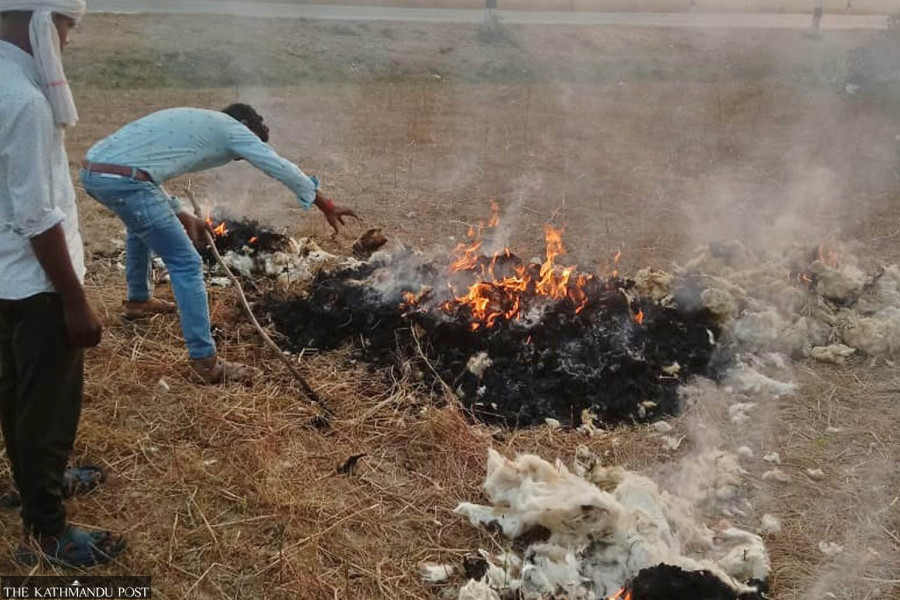Money
Kapilvastu shepherds destroy wool stock as market dries up and storage space runs out
In the face of severe hardship, they look to the government to revive the wool market and preserve their way of life.
Manoj Paudel
Laxman Pal, a 20-year-old from Madhunagar in Vijayanagar Rural Municipality in Kapilvastu district, currently spends his days tending sheep. He is the third generation of his family raising Himalayan sheep in the Tarai region. His father, Lalman, and grandfather also spent their lives as shepherds.
However, for the past three years, Laxman has faced difficulties in the sheep farming business, especially when it comes to selling wool. With no buyers, the wool piled up at home, forcing him to burn three quintals of it last week.
"I started herding sheep when I was around 4 or 5 years old, which made me miss out on education. Earlier, wool would bring in around Rs40,000 annually. But for the past three years, without any sales, I had no choice but to burn it," he said.
Punnawasi Pal, another shepherd from the same village who has also been raising sheep for three generations, burned two quintals of wool. He used to earn about Rs50,000 a year from selling wool.
"After all the hard work of shearing and saving the wool, it was heartbreaking to just burn it," he said. "We waited for traders for three years, hoping they would come. But when we ran out of space to store it, we had no choice but to burn it."
About ten families in Madhunagar who depend on sheep farming have not been able to sell their wool.
They say it has become difficult to manage household expenses as the wool from their sheep, raised through loans and hardships, remains unsold.
Shepherd Ramchandra Pal said that apart from selling live sheep, the income from selling wool usually helped cover essentials like salt, oil, and grains.
"Earlier, wool traders would come door to door to collect the wool. It's been three years now, and no one has come. How long can we keep piling it up? With no space left at home, burning it was the only option," he said.
Currently, these ten families have about 40 to 50 quintals of unsold wool. Laxman said that 4–5 people have already burned over six quintals of wool.
"I still have about 50 sheep in my shed, sometimes even up to 80. I burned three quintals of wool and still have more than three quintals left," he said. "Our family of six lives in just three rooms. With the rainy season approaching and no space left, I will have to burn the remaining wool too."
Punnawasi, who keeps about 200 sheep, said he has stored over five quintals of wool in a clay granary at home due to space shortages. "I kept two quintals in sacks outside and burned another two quintals. Since we grew a little wheat this year, we need to empty the granary to store it," he said.
Across Madhunagar village, farmers have raised over a thousand sheep. In ward 11 of Krishnanagar Municipality, there are two households with more than 200 sheep each. Wool from sheep is typically used to make warm clothing items, such as blankets, sweaters, and caps.
However, local resident Ramakant Chaudhary noted that the arrival of modern synthetic blankets, hats, and scarves to the market has significantly reduced the demand for wool products.
"Earlier, there was a high demand for wool-based clothing, and it sustained the livelihoods of many," he said. "Now, with the closure of such factories, the demand for wool has diminished." He suggested that local governments should assess the situation and take appropriate action.
Sheep are sheared three times a year — in June-July, October-November and February-March.
Recently, grazing areas for sheep in the Tarai have also shrunk. "Earlier, there were plenty of fields and pastureland," said local Pratap Pal. "Now, the lack of grazing areas is making sheep farming more difficult."
Sheep raised in the Tarai tend to have longer tails, which leads locals to avoid eating their meat, treating them more like cattle. For these farmers, selling live sheep and wool is their primary source of income.
Indian traders regularly visit to purchase live sheep, selecting healthy ones for prices ranging from Rs10,000 to Rs20,000. However, these traders do not buy wool. In the Nepali market, wool usually sells for Rs130 to Rs150 per kg.
Despite the hardships, these families, who have little or no farmland and live mostly on tenants, still see their future in sheep farming. With only their experience in sheep rearing to rely on, they are determined to carry on.
The sheep do not stay in pens, so the farmers keep them overnight in nearby empty fields, farmlands, and orchards, taking turns to guard them through the night and leading them out to graze early in the morning.
During the rainy season, from July to September, they move the sheep to the banks of the Arra River. In October, they take them to the northern forest area of Bhalwar in Kapilvastu for grazing, where they stay for about a month and a half.
Fifty-six-year-old Kashiram Gadaria said they carry food supplies and bedding from home during these migrations. "If we don't move with the sheep, we can't survive. Our children would go hungry and miss school, so we have no choice but to endure the heat and hardship," he said. "The only property we have is our sheep. We have no other source of income, so there's no alternative but to continue sheep farming."
They typically sell their sheep to Indian traders, earning between Rs200,000 and Rs400,000 annually.
Local resident Bhola Gupta stated that to protect these sheep farmers, local governments must take action to assist them. He suggested the municipality could step in to buy and market the wool, which would also support the government policy of ‘one local unit, one product.’
So far, the local government has not provided any aid to the sheep farmers.
However, Prahlad Thakur, head of the Livestock Health Division of Vijayanagar Rural Municipality, acknowledged the farmers' concerns and stated that they are planning to coordinate with various agencies to facilitate wool sales.
This year, a sheep shelter improvement programme has been initiated for the farmers. Rural Municipality Chairperson Gopal Thapa said that discussions are ongoing to create supportive plans for the shepherds.




 20.97°C Kathmandu
20.97°C Kathmandu













.jpg&w=300&height=200)

